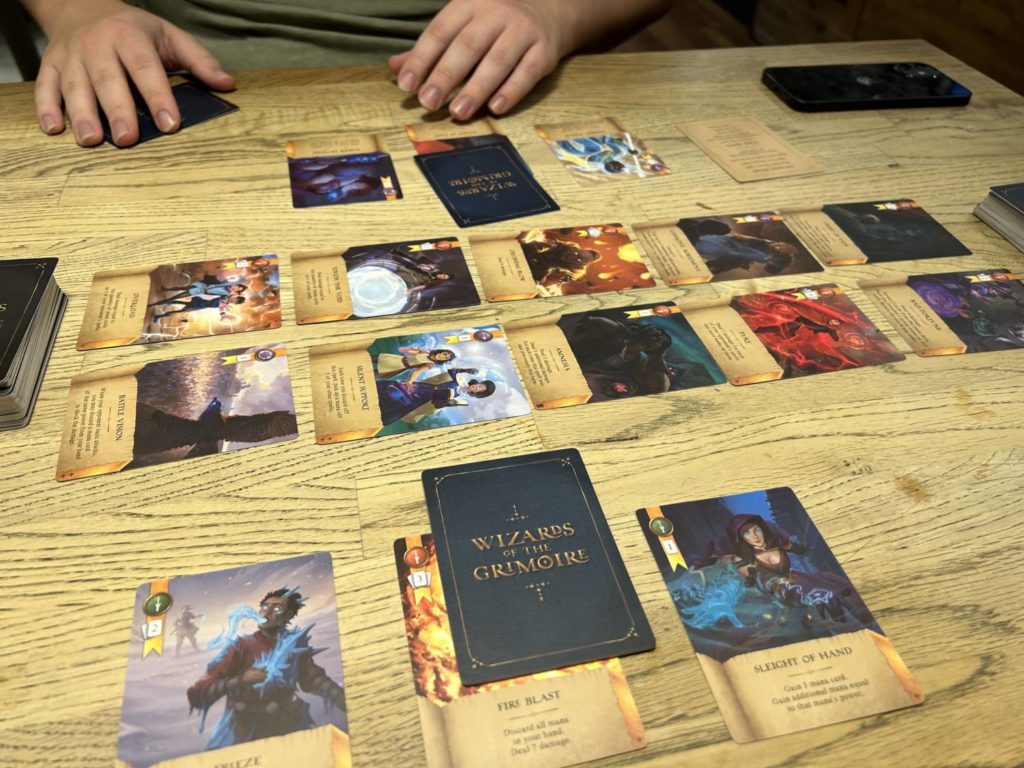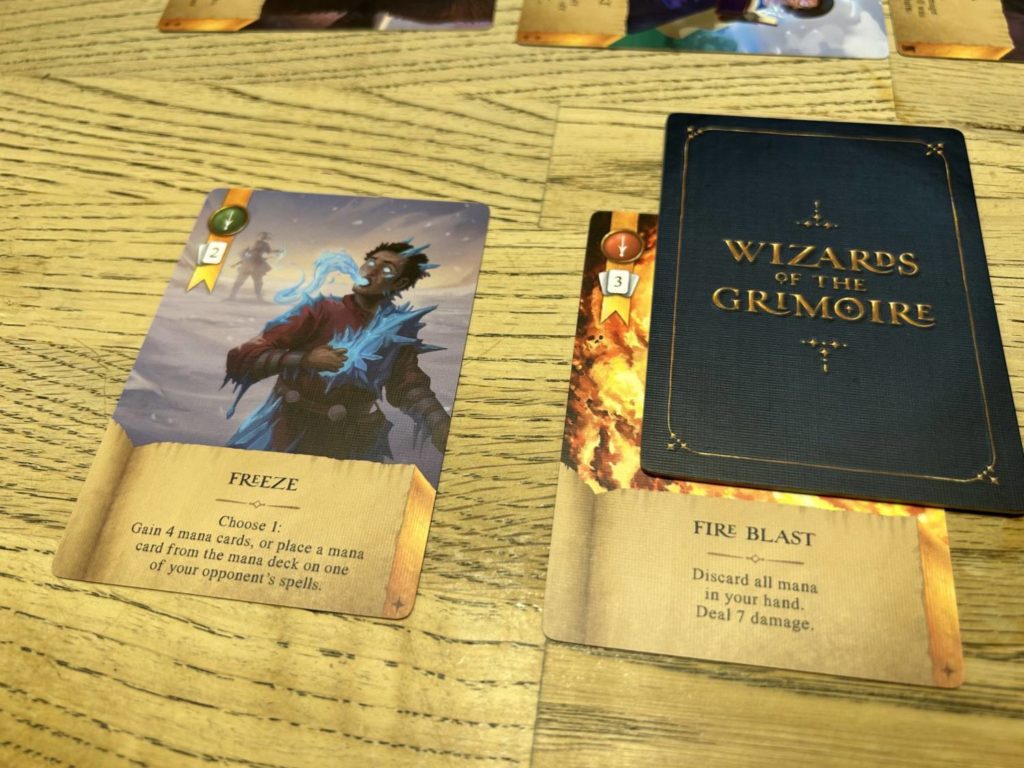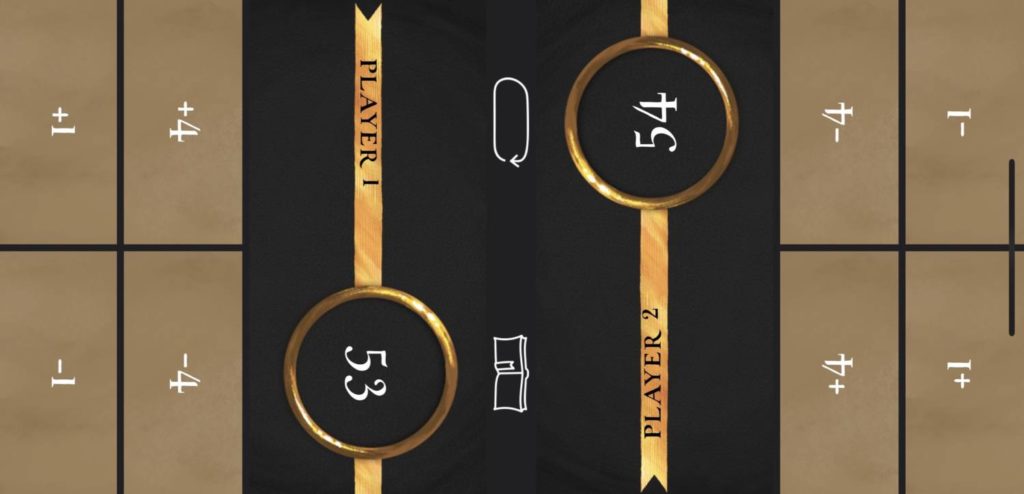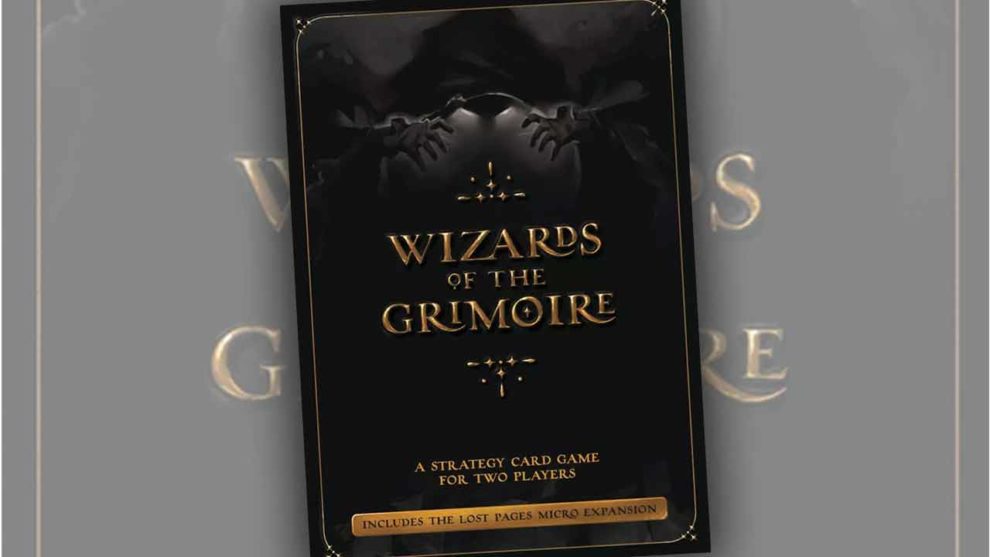The Archmage Andor is dead. You had nothing to do with it, of course. Of course. Sure, you’ve been waiting years to sit in the big chair, to hold the big musty tome, to cast the big spells, but murder? Perish the thought. Even if you had anything to do with it, you didn’t plan well. You’re not the only heir apparent, apparently. The Archmage Andor was unfamiliar with the Rule of Two, and now you and your adversary have to fight to the death.
Wizards of the Grimoire is a fast-paced, two-player engine-building dueling game, an impressive number of hyphenates for such a small box. During the first six rounds, each player starts their turn by adding a new spell from the central market to their tableau. Spells come in one of three flavors, either causing damage, giving you more mana with which to cast other spells, or allowing you to shift the mana on your spells around. Starting on your seventh turn, taking a new spell from the market is voluntary, and can only be done if you have a spell that qualifies for replacement.

The rest of each turn is spent allocating mana cards from your hand to your spells, deciding which ones you want to pay for and in what order. So far, this is standard stuff. Magic: The Gathering’s lawyers are sharpening their pencils as I type. The similarities are only skin-deep, though. Dueling? Yes. Mana to pay for spells? Yes. But Wizards of the Grimoire is much more interested in questions of timing. You could make the argument that this is a rhythm game if you wanted to, and I kind of want to.
Parapa the Engine Builder
Years ago, I spoke to a mechanical engineer who worked in a factory. His job every morning was to get the machines to run 180º out of phase with one another, so their sound waves would cancel each other out, making the factory floor quieter. That’s basically your job here, but you’re trying to make the machine as loud as possible. Wizards is about timing, figuring out when it’s best to pay for Spell X or Spell Y to get it into sync with Spell Z.
When you pay for a spell, you do so by putting between 1 and 5 mana cards on top of the spell card itself. At the beginning of each turn, you discard one mana from each of your spells, which cannot be recast until they’re uncovered. What’s more, spells take effect at different times in relation to when you cast them. Some activate the moment you lay that mana down, and won’t do anything else until they’ve been cleared and you pay for them again. Others are active for as long as mana remains on the card. There’s a third kind, my favorite, which activates once the final mana is removed.
Managing to get all of your spells in sync is hard. Repeated play is rewarded with an increasingly refined sense of what to cast when. Holding out on casting a spell that throws your opponent off their rhythm is satisfying. It is easy to play Wizards of the Grimoire. It is hard to play it well.

All Hands on Deck
Wizards of the Grimoire will certainly appeal to Magic players, and they in turn would likely find great success in introducing it to others. Magic is heavy with decades worth of meta, and a constant need to turn up the dial. Wizards of the Grimoire feels like Magic in the 90s, with clean combos and minimal rules overhead. Another plus: the only way to end up with a dead turn is through either a mis-play or conscious choice.

This is a beautiful product. These are probably the nicest playing cards I’ve ever seen, with strong stock and linen finish. After six or seven plays, you can’t tell the cards have even been touched. The box, too, has held up to a lot of travel. You get your money’s worth in terms of product and design. A coworker pointed out that the game could come in a box half its size by consolidating the mana deck into the spell deck and putting mana power on each spell instead of having an entire separate set of cards. That’s as close as we’re getting to a complaint from me, though.
No question about it, Wizards of the Grimoire is a crackerjack design. The Cool Down mechanic is inspired. The art is textbook Serious Fantasy, but it’s good textbook Serious Fantasy. This game knows who it wants to appeal to, and it goes about appealing to them in expert fashion. If the mechanisms and the theme appeal to you, you’re not going to be disappointed.











Add Comment